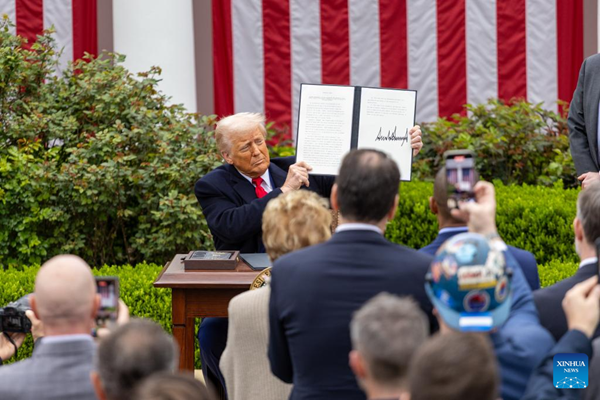
 0 Comment(s)
0 Comment(s) Print
Print E-mail China.org.cn, April 8, 2025
E-mail China.org.cn, April 8, 2025

U.S. President Donald Trump shows an executive order on "reciprocal tariffs" in the Rose Garden at the White House in Washington, April 2, 2025. [Photo/Xinhua]
As U.S. President Donald Trump signed an executive order imposing so-called "reciprocal tariffs" targeting certain trading partners, including China, international experts warned of the broader consequences of such protectionist and unilateral trade policies. Amid growing global uncertainty, these experts underscored China's economic resilience and commitment to multilateralism.
Carl Fey, a professor of strategy at BI Norwegian Business School, called the tariffs imposed by the U.S. government "a lose-lose-lose situation," saying "they hurt the U.S., they hurt China and they hurt the rest of the world."
Fey argued that instead of fostering competitiveness, tariffs pressure businesses to restructure supply chains in inefficient ways, pushing countries to produce locally rather than in regions that hold comparative advantages. He added that the tariffs imposed by the U.S. government mean the "world will accomplish less as a whole."
The Chinese government also issued a statement opposing U.S. abuse of tariffs, pointing out that under the guise of pursuing "reciprocity" and "fairness," the U.S. is engaging in zero-sum games and, in essence, seeking "America First" and "American exceptionalism," which subverts the existing international economic and trade order.
The reciprocal tariffs will also have multiple repercussions on U.S. households and the broader economy. A recent Yale University study projected that if trading partners retaliate, U.S. personal consumption expenditures (PCE) prices will rise by 2.1%, equivalent to a loss of $2,700 to $3,400 per household on average. The study also predicted a 1-percentage-point decline in U.S. real GDP growth in 2025.
While global trade is being tested by rising unilateralism and protectionism, experts remained optimistic about China's economic resilience and long-term potential. Denis Depoux, global managing director at Germany-based consultancy Roland Berger, dismissed notions of an "economic collapse" in China, citing the country's strong economic value and technological advancements.
Depoux highlighted China's evolution from a manufacturing hub to a global technological player. "China has invested heavily in R&D, and while its companies are still focused largely on the domestic market, the next step is for them to expand globally," he said.
He proposed a shift from a "Made in China" to a "Designed in China" model. With Chinese companies gaining international recognition, Depoux encouraged them to focus more on investing overseas and cooperating with local markets to become true multinational players.
Depoux also noted that China's tech-savvy, innovation-driven consumers and businesses make it an increasingly attractive destination for foreign companies, particularly those seeking to explore tech-driven opportunities.
Though concerned about the threat that tariffs and restrictive trade policies pose to global supply chains, Depoux remains confident in the future of globalization, albeit in a new form.
"Efficient global supply chains, driven by comparative advantages, create prosperity," he said. "Protectionism only hampers this process. We need to fend it off."
Guy Ryder, U.N. under-secretary-general for policy, echoed these sentiments. He warned of rising risks of fragmentation in global supply chains, yet reaffirmed confidence in the principles of open trade.
"Fortunately, many international organizations oppose policies like those of U.S. President Donald Trump," Ryder said. "I don't believe the system of open trade is over."
Ryder praised China's consistent support for multilateralism. "No country — not even the largest — can solve today's global problems alone," he said. "In these challenging times, China's commitment to multilateralism is especially important."